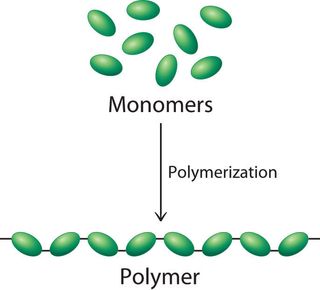Polymers in Building And Construction: Stronger, Less heavy, and Extra Sturdy
Wiki Article
Exploring the Varied Applications and Benefits of Polymers in Different Industries
Polymers, with their varied range of properties and capabilities, have come to be vital in different sectors, each enjoying unique advantages from their application. From enhancing safety and security and performance in the auto industry to changing medical tools in the health care sector, polymers play a critical duty.Automotive Industry Applications
Polymers play a pivotal function in boosting the performance and longevity of different parts within the automotive market. These versatile materials are thoroughly made use of in the manufacturing of various components, ranging from interior elements to under-the-hood applications. One noticeable use polymers in the vehicle sector is in the production of light-weight parts. By replacing conventional steel get rid of polymer-based choices, vehicles can accomplish better gas efficiency without jeopardizing on stamina or safety and security.

Healthcare Industry Advantages
In various health care applications, the advantages of using polymers are commonly acknowledged for their varied variety of valuable properties. Polymers play an important function in the health care market due to their flexibility, biocompatibility, and cost-effectiveness. One of the primary advantages of polymers in healthcare is their capacity to be customized to certain demands, such as versatility, toughness, and biodegradability, making them suitable for a large range of medical applications.Polymer-based materials are thoroughly made use of in medical devices, such as catheters, implants, prosthetics, and drug distribution systems, as a result of their biocompatibility and capability to simulate natural cells. These products can decrease the risk of allergies or beings rejected, enhancing patient safety and security and results. Additionally, polymers are light-weight, making them ideal for wearable medical devices and making certain individual comfort.
Furthermore, polymers make it possible for the development of ingenious therapy techniques, such as hydrogels for cells engineering and nanocomposites for targeted medicine delivery. Their simplicity of handling and sterilization makes them crucial for maintaining high criteria of hygiene in health care setups. Overall, the diverse benefits of polymers contribute substantially to innovations in medical modern technology and client treatment.
Environmental Benefits of Polymers

Furthermore, polymers can contribute to energy cost savings because of their light-weight nature. In sectors such as transport, light-weight polymer products can aid reduce gas consumption and greenhouse gas discharges. Furthermore, polymers can allow the advancement of energy-efficient items such as insulation products that enhance energy conservation in buildings.
Additionally, polymers play a vital duty in lowering water air pollution. For instance, the usage of polymer-based purification systems can properly get rid of contaminants and pollutants from wastewater, securing water resources and communities. On the whole, the ecological advantages of polymers make them important assets in advertising sustainability and green methods across various sectors.
Polymers in Electronics and Technology
Thinking about the enhancing useful content demand for cutting-edge and sustainable solutions in modern-day markets, the integration of innovative polymer innovations in the realm of electronic devices and technology has actually emerged as a pivotal approach for driving efficiency and efficiency. Polymers have revolutionized the electronics market by making it possible for the manufacturing of lighter, extra adaptable, and resilient digital gadgets. From smartphones to medical tools, polymers play a critical function in boosting product style and functionality.One considerable benefit of polymers in electronics is their shielding buildings, which assist shield delicate electronic parts from environmental aspects and electric interference. Furthermore, polymers are crucial in the advancement of adaptable displays, wearable innovation, and published electronic devices, offering limitless opportunities for creating smart anchor and interconnected gadgets.
In addition, making use of polymers in electronic product packaging has actually brought about developments in miniaturization and thermal administration, boosting the general performance and integrity of digital systems. As technology continues to progress, the convenience and adaptability of polymers will certainly drive even more advancement in the electronics industry, shaping the future of innovation.
Function of Polymers in Building And Construction and Framework
The integration of advanced polymer materials in construction and infrastructure projects has revolutionized the way structures are designed and integrated in contemporary times. Polymers offer various advantages in the construction industry as a result of their convenience, durability, and cost-effectiveness. One key duty of polymers in construction is their use in coatings and sealers, giving defense against environmental factors such as dampness, UV radiation, and deterioration. Additionally, polymers are made use of in the production of light-weight and high-strength composite materials, enhancing the architectural honesty of buildings while decreasing overall weight.Moreover, polymers play a critical function in sustainable building practices by making it possible for the development of energy-efficient frameworks. Insulating products made from polymers assist regulate indoor temperatures, minimizing the need for heating and cooling down systems and eventually decreasing energy intake. Additionally, making use of polymer-based composites in facilities tasks such as bridges and roads boosts their longevity and minimizes maintenance expenses. On the whole, the incorporation of polymers in building and infrastructure showcases their substantial impact on contemporary design methods.
Final Thought
In verdict, polymers play a crucial role in various sectors such as automobile, like it healthcare, environmental, electronics, and construction. Their flexible residential properties make them beneficial in developing cutting-edge remedies and items. From boosting gas performance in cars to improving clinical gadgets, polymers offer numerous advantages. In addition, their effect on reducing waste and advertising sustainability highlights their relevance in modern-day applications. The extensive use of polymers demonstrates their significant payment to progressing innovation and enhancing quality of life.Report this wiki page